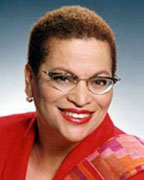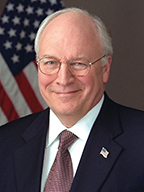
By Julianne Malveaux
(TriceEdneyWire.com) – Dick Cheney, who died this week at age 83, was one of the most powerful and controversial figures in modern American politics. The former Vice President leaves behind a complicated legacy—marked by the Iraq War, expanded executive power, and decades of polarizing policy.
Yet in his twilight years, Cheney performed an act of rare political courage: he stood against Donald Trump and, in a move that shocked Washington, endorsed Kamala Harris for president. That single act—rooted in principle rather than politics—may well be remembered as his finest hour.
Cheney’s endorsement of Harris was not a conversion to liberalism. It was a declaration of loyalty to democracy itself. He did not suddenly embrace the Democratic platform; rather, he rejected the authoritarian drift that has consumed the Republican Party he once helped lead. Cheney understood, perhaps more clearly than most, how fragile our democratic institutions can be when power is placed above principle. When he endorsed Harris, he wasn’t crossing the aisle—he was drawing a line in the sand.
In his lifetime, Cheney was known for his stern demeanor and hard-right convictions. He was the architect of the Bush-era doctrine that justified preemptive war. Progressives saw him as the embodiment of imperial overreach. But in his later years, Cheney found himself cast out by the very movement he once helped define. His insistence that truth and constitutional order mattered more than personal loyalty put him squarely at odds with Trumpism.
When his daughter, Liz Cheney, joined the January 6th Committee to hold Trump accountable, she became a political exile in her own party—defeated in Wyoming by a Trump-endorsed challenger. Dick Cheney’s support for her stance, and his unflinching criticism of Trump, made clear that the Cheneys’ conservatism was grounded in respect for the rule of law, not blind allegiance to a man.
Trump’s response to Cheney’s integrity was predictable and petty. When Cheney and his daughter endorsed Kamala Harris in 2024, Trump took to his social-media platform to call them “irrelevant RINOs”—Republicans in Name Only—and mocked Cheney’s long career in government. He conveniently ignored that he himself had once praised Cheney for his toughness, even pardoning Cheney’s former aide Scooter Libby in 2018. That reversal—from admiration to ridicule—captures the moral collapse of Trump’s Republican Party. In Trump’s world, loyalty matters more than leadership, and dissent is treated as betrayal.
Even in death, the divide remains sharp. As of this writing, Trump has not issued a statement mourning Cheney’s passing. His silence speaks volumes. Every living president—Democrat and Republican alike—has acknowledged Cheney’s immense, if complicated, role in shaping American foreign and domestic policy. But Trump, consumed by grievance and incapable of grace, could not bring himself to offer even a perfunctory condolence. In contrast, Kamala Harris issued a thoughtful statement recognizing Cheney’s “lifelong commitment to American democracy,” signaling that his endorsement was both meaningful and memorable.
For Democrats like me, praising Dick Cheney doesn’t come easily. His record on war, torture, and secrecy remains indefensible. He presided over some of the darkest chapters in recent U.S. history. Yet history is often a study in contradiction. Cheney’s late-life transformation—his vocal rejection of Trumpism, his defense of the Constitution, and his willingness to put country over party—deserves acknowledgment. Redemption doesn’t erase wrongdoing, but it reveals that conscience can survive even in the most unlikely places.
Cheney’s opposition to Trumpism was not rhetorical; it was existential. He understood that Trump’s contempt for truth and law was incompatible with any functioning democracy. “In our history,” Cheney said in a 2022 campaign ad for his daughter, “there has never been an individual who is a greater threat to our Republic than Donald Trump.” Those words were prophetic. They came not from a liberal pundit or a Democratic strategist, but from a man who once stood at the heart of conservative power.
When Cheney endorsed Kamala Harris, he reminded Americans that patriotism is not defined by party, but by principle. His death closes a tumultuous chapter in Republican history, one where courage became a rare commodity. Cheney was never a man who sought applause; he often thrived on controversy. But in the end, he stood for something larger than politics.
For all his faults—and there were many—Dick Cheney’s final years revealed the flicker of a statesman’s soul. His defiance of Trump, his defense of democracy, and his willingness to speak uncomfortable truths earned him a measure of redemption. When he endorsed Kamala Harris, he stood not just against a man, but against the corruption of a movement. In that moment, Dick Cheney—the architect of hard power—showed moral strength. And for that, history may judge it, rightly, as his finest hour.
Speaker Mike Johnson (R-La.) and his despotic minions have less than a fraction of Cheyney’s moral courage. They might reflect on Cheyney’s legacy as they continue to pay tribute to their unhinged leader.

